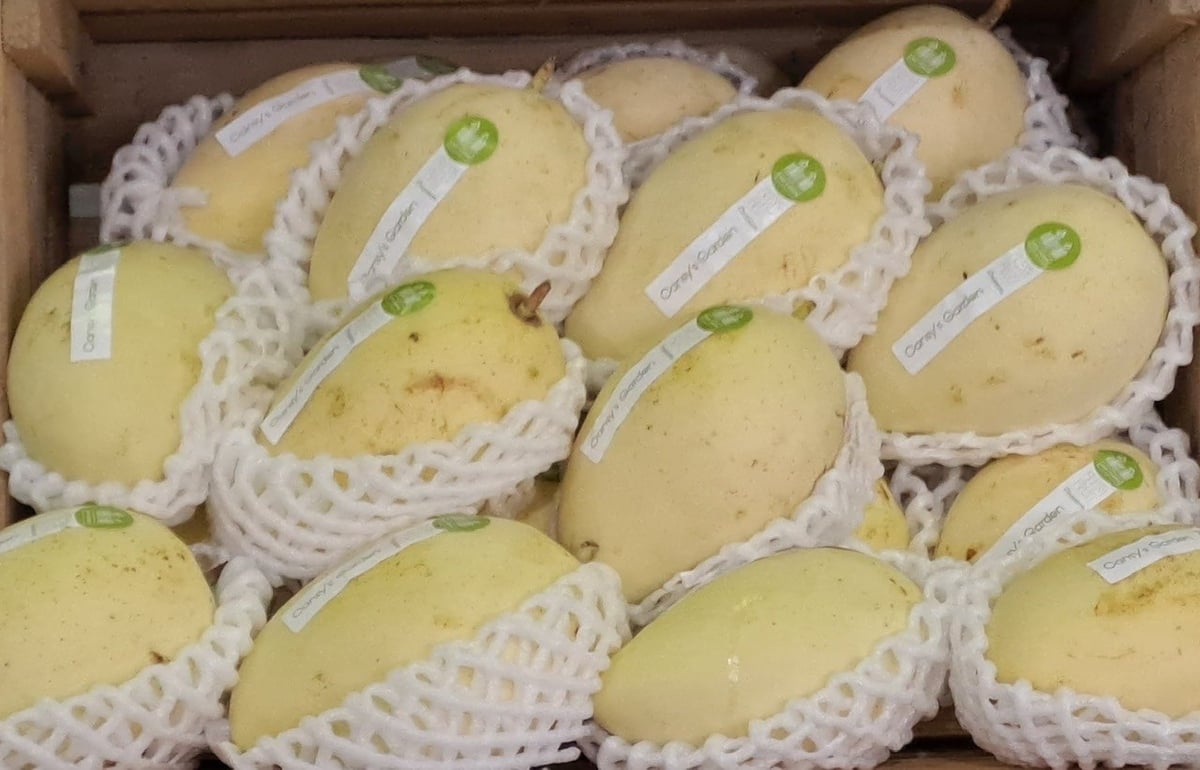November 13, 2025 | 06:43 GMT +7
November 13, 2025 | 06:43 GMT +7
Hotline: 0913.378.918
November 13, 2025 | 06:43 GMT +7
Hotline: 0913.378.918
Businesses shared this information at the seminar “Market share growth – Positioning Vietnamese brands in the digital space” organized by Sai Gon Giai Phong Newspaper on September 9.
Mr. Nguyen Dinh Tung, Vice Chairman of the Vietnam Fruit and Vegetable Association, said that Vietnamese fruits are now present in many demanding markets, such as the US, Japan, South Korea, and Canada. These are markets that more than 10 years ago we thought were very difficult to access, but now Vietnamese fruits have successfully conquered them.

Mr. Nguyen Dinh Tung - Vice Chairman of the Vietnam Fruit and Vegetable Association believes that joint efforts are needed to build the brand of Vietnamese agricultural products. Photo: Hoang Hung.
However, he pointed out that trust in Vietnamese agricultural products is still not consistent even in the domestic market. At times, consumers thought Vietnamese fruits were of poor quality and cheap, while in reality, to export a batch of dragon fruit to the US, businesses must comply with strict quarantine procedures and transport them by air, with costs reaching USD 6-7/kg. If the products do not meet standards, we cannot enter the US or Japan.
From the perspective of someone directly bringing Vietnamese goods into the US retail system, Mr. Kris Nguyen, Founder of New Ocean, believes that opportunities for Vietnamese agricultural products in the US market are huge. “According to a survey, out of every 10 cashew nuts on American dining tables, 8 come from Vietnam. Besides cashew nuts, many fruits such as Bac Giang lychee have already entered Costco - the largest retail chain in the US with thousands of selling points”, he cited.
However, to enter these retail systems, Vietnamese businesses must overcome many strict requirements. US partners demand clear traceability, production processes that meet international standards, and a stable supply chain. Some partners even send experts to factories in Vietnam to check production processes, while also requiring businesses to set up warehouses in the US to ensure timely supply.
What is remarkable, according to Mr. Kris, is that US consumers do not care about company names but only remember that the product comes from Vietnam. “They will say Vietnamese cashews, but not remember which company produced them. What they care about is the quality and reliability of Vietnamese agricultural products. International consumers do not remember the name of a specific company, they only know it is Vietnamese fruit. Agricultural branding is not the private asset of a business but a shared value that needs to be protected and elevated. Therefore, we need a well-structured national brand strategy, just like how South Korea or Japan have done with their agricultural products”, he analyzed.

A well-structured strategy is needed to build the brand of Vietnamese agricultural products. Photo: Ha Duyen.
In addition, Mr. Kris suggested that the State should accompany businesses in trade promotion, promoting the image of Vietnamese agricultural products on international media channels, and especially support market access through digital platforms. “This is not only about exporting a few containers of fruit, but about building the image of Vietnam as a reputable and quality supplier in the global market”, Mr. Kris emphasized.
According to Dr. Dinh The Hien, many Vietnamese businesses have now started focusing on building brand stories and improving quality, but still lack strong brands in the mid-to-high-end segment. International marketing remains weak, and positioning in the digital space has not been systematically invested in. Therefore, Vietnamese brands are currently in the “middle zone” compared to cheap Chinese goods and regional mid-to-high-end brands.
To develop a sustainable brand, Vietnamese businesses must upgrade digital tools while transitioning to a digital brand model capable of competing regionally. One key solution is applying artificial intelligence in the customer journey. This strategy helps increase conversion rates, retain customers, optimize costs, and transform customer data into personalized experiences, making brands closer, smarter, and more reliable in the eyes of consumers.
In addition, experts recommend that businesses strengthen their cooperation with international e-commerce platforms such as Amazon, Alibaba, and Shopee Global to expand their distribution channels. Exploiting digital platforms not only helps save marketing costs but also creates opportunities to reach millions of consumers in many different regions directly. If national branding is combined with digital branding, Vietnamese agricultural products will affirm their credibility and increase value and global coverage in a fiercely competitive context. In particular, telling product stories associated with cultural and regional elements will create distinctive identities, helping Vietnamese goods gain a more sustainable advantage in the international market.
Translated by Huong Giang

(VAN) From humble local delicacies, many businesses in the Mekong Delta have successfully conquered domestic and international markets with their distinctive One Commune One Product (OCOP) goods, contributing to sustainable rural economic development.

(VAN) The Vietnamese tilapia industry is only in the initial stages of export, yet its growth potential remains vast. To reach further, it needs to focus on breed stock, technology, and deep processing.
/2025/11/08/3402-1-212706_176.jpg)
(VAN) Viet Nam's fruit and vegetable exports continued to reach an extremely high turnover in October. With this growth momentum, the sector is expected to set a new milestone of USD 8.5 billion in 2025.
/2025/11/08/4950-1-163820_289.jpg)
(VAN) During the 2021–2025 period, Viet Nam's agro-forestry-fishery processing industry has made remarkable progress, achieving an average growth rate of 8%/year.

(VAN) Over 80 years, Vietnamese rice has journeyed through half a century to become a symbol of knowledge, resilience, and the new nation’s agriculture stature.

(VAN) The traders estimated that the lowest price in the tender, closed on Thursday by Bangladesh's state grain buyer, to buy 50,000 metric tonnes of rice was $355.59 per metric ton CIF, liner out.

(VAN) The information shared by Dr. Ngo Xuan Nam, Deputy Director of Viet Nam Sanitary and Phytosanitary Notification Authority and Enquiry Point (SPS Viet Nam), on October 30 during a conference on food safety regulations.